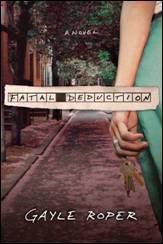 When I opened Gayle Roper’s Fatal Deduction, I was expecting a mystery. After all, the copy on the back advertises a story about a stolen diamond, a botched kidnapping and a dead body turning up on a doorstep. There’s even a category blurb in the bottom-right corner branding it as “Fiction / Suspense.” It was a reasonable assumption, right? Maybe, but it wasn’t an accurate one.
When I opened Gayle Roper’s Fatal Deduction, I was expecting a mystery. After all, the copy on the back advertises a story about a stolen diamond, a botched kidnapping and a dead body turning up on a doorstep. There’s even a category blurb in the bottom-right corner branding it as “Fiction / Suspense.” It was a reasonable assumption, right? Maybe, but it wasn’t an accurate one.Nowadays, literary theorists like to argue that genre is nothing more than an arbitrary social construct that inevitably crumbles when pushed hard enough, and there’s some truth to it. After all, a lot of interesting material gets categorized under the unhelpful labels of “cross-genre” and “interstitial.” Experience tells us, though, that most authors cling to the arbitrary guidelines that ivory-tower academics love to hate and that readers like it that way. But issues arise when the genre on the cover doesn’t match the genre on the pages.
Such issues are evident from the get-go with Fatal Deduction. A heroine shouldn’t first worry about her own gracelessness when tripping over a corpse. Rich loan sharks with extravagant tastes and a yen for the hard stuff wouldn’t be caught dead sipping Jack Daniel’s. And Tasers aren’t the weapons of choice for really bad guys. But these objections seem silly once you deduce the true category into which the work falls. The heroine is a lonely, twenty-nine-year-old single mom who worries about the wellbeing of her teenage daughter? And she meets a strapping divorcee who’s tough as nails one moment and openly weeping over his feelings the next? And there are paragraphs devoted to descriptions of food? Waitasecondhere, this is Chick lit!
Yes, Chick lit, that genre devoted solely to female wish fulfillment. Okay, okay, I know I’m not qualified to judge such things. Who knows, if you don’t mind reams of expository prose and pop-culture references that give it about as much shelf life as a jug of milk, you might even like the novel. But if you’re looking for mystery, stick with Hammett and Lehane.


4 comments:
I'm still not sure what a literary mystery is. And, while I'm not much of a reader of theory, I get the impression that people intend no compliment when they call this, that or the other thing "a social construct." The idea that agreed-upon social categories are a bad thing strikes me as not terrible consistent with reality.
Now, don't go turning me into a theorist.
===================
Detectives Beyond Borders
"Because Murder Is More Fun Away From Home"
http://detectivesbeyondborders.blogspot.com/
The idea that agreed-upon social categories are a bad thing strikes me as not terrible consistent with reality.
I agree entirely. (Guess I didn't make that clear in my post.) I got very tired of my deconstruction-loving lit profs about my senior year. Suppose that's why most of my reads are genre fiction of some sort -- an act of rebellion.
Looking very much forward to In The Woods!
No, you made your position clear. I was just attacking the notion perhaps a bit more strongly that you were. I suppose I might say to a pesky deconstuctionist that yes, the categories are social constructed and arbitrary, but so what? What else could they be?
In the Woods is on the way. I put it in the mail this afternoon.
==============
Detectives Beyond Borders
"Because Murder Is More Fun Away From Home"
http://www.detectivesbeyondborders.blogspot.com/
Stupendous! I'll probably review it here. It sounds like a unique title.
Post a Comment